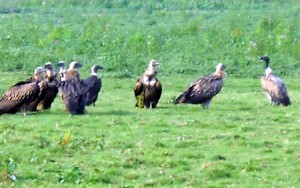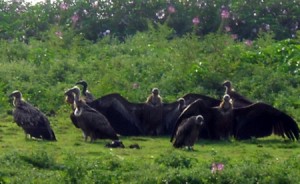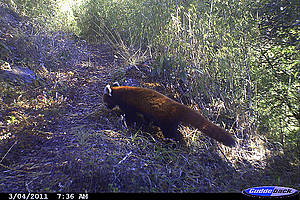 A flock of more than 40 White-rumped vultures was sighted in Assam Sivasagar district’s Panidihing Bird sanctuary recently. Considering that these vultures are in the list of critically endangered species, it is heartening news that after 3 years they were seen in such large numbers.
A flock of more than 40 White-rumped vultures was sighted in Assam Sivasagar district’s Panidihing Bird sanctuary recently. Considering that these vultures are in the list of critically endangered species, it is heartening news that after 3 years they were seen in such large numbers.
This vulture species (Gyps bengalensis) has been on rapid decline since the early nineties; as much as 99% in just two decades. The white-rumped vultures are the most common of the nine vulture species, found in the Indian subcontinent yet facing threat to their very existence.
Nature’s Scavengers:
Vultures are hailed as nature’s scavengers as they feed on animal carcasses left in the open. Their digestive systems are adapted to destroying pandemic causing pathogens. They contribute in maintaining a healthy balance in ecosystem. Naturally a decline in vulture population is cause for worry, as otherwise animals like dogs and rats take the role of primary scavengers and in a thickly populated country like India, outbreak of pandemic diseases could be devastating, said Rahul kaul, WTI’s (Wild life Trust of India) chief ecologist.
Diclofenac the Culprit:
Use of NSAID or Steroidal Anti Inflammatory Drug for veterinary purposes has been identified as responsible for decline in vulture population. Commonly known as ‘Diclofenac’, this drug was administered by veterinarians in treating livestock. The residue of the drug in animal carcasses when consumed by vultures causes renal failure and leads to poisoning and death of vultures in large scale.
Chief veterinarian of WTI, Dr. NVK Ashraf said “With the rapid decline in vulture populations, a search for an alternative non-steroidal anti-inflammatory drug that does not cause this kind of damage led to the discovery of Meloxicam being non-lethal.”
He attributes renal failure of vultures to the use of diclofenac as revealed in autopsy of visceral gout.
Meloxicam, a safer alternative:
Meloxicam, a safer alternative is now being introduced in place of diclofenac. As such, the Drugs and cosmetics act, 1940, was also amended in 2008 and a blanket ban was introduced on the manufacture, sale and distribution of diclofenac for veterinary purposes.
To a great extent, the ban has resulted in stoppage of diclofenac use legally for veterinary practices but it is still available for human use. Some of the reasons why diclofenac is still in use could be that people concerned are not aware of the destructive effects of this drug. Non availability locally of meloxicam, and that diclofenac is cheaper comparatively could also be the reasons why its use is not completely stopped.
 Creating Awareness:
Creating Awareness:
Some of the agencies, NGOs and Governmental organisations are on the move to step up, promote use of meloxicam instead of diclofenac and gradually phase out diclofenac. A Rapid Action Force (RAP) for conserving vultures is being carried out by an NGO of sivasagar by name ‘Seven Look’ since last June. To create awareness among locals several activities were performed supported by charities Aid Foundation and WTI.
General Secretary of ‘Seven Look’, Palash Ranjan Goswami, who was instrumental in proposing and implementing RAP said “Apart from the threats faced by vultures from diclofenac use, in Sivasagar there were several instances of vultures being poisoned. Recalling such instances, 21 vultures succumbed to poisoning in two villages within a week during April-May 2009. The RAP aimed at spreading awareness on the significance of vultures, threats to them, about the ban in diclofenac and the alternative available etc.”
Ban on diclofenac seems to have produced positive results in at least some areas. Sighting of these vultures in considerable numbers would offer some solace for bird lovers and ornithologists.
– Freelance Contributor
Article source: WTI
Image courtesy: Palash Ranjan Goswami / WTI
Related Stories:





it is very very good news for a bird lover and have a keen eye on nature. i have personal experience of this cleansing bird of nature. i dare to contend that there may be other causes of fatality of this bird other than visceral gout caused by diclofenac. such as suddenly emerging poultry farming industry involving carcass use in this industry causing dinosaur death of this bird or at least weakening of body defense to counter infections and weather extremes or may be any organism such as new mutant of any virus which have turned virulent. it is found in Pakistan in Thar which like Assam has no removal of carcass by poultry industry and natural deaths of its food, such as goats, camels, cows etc. hoping for favor in solution of this riddle to better conserve this majestic environment friendly bird
Thank you for sharing your valuable information with us. I completely agree that there might be other reasons for vulture deaths however in a study conducted by bird life, and organisation working towards the conservation of birds, it was found that diclofenac is the number one cause of their death. I really thank you for bringing to notice the other causes too which though lesser in impact are no less important.
Was reading the other day that diclofenac was supposed to be phased out by 2005.is it still available and if yes what are the govt plans to implement the ban. Remember watching so many of these birds as a child and now havnt seen them for a couple of years.
you are right Ankur, Diclofenac is banned, but it is still available as a human drug and it is that which is used illegally by farmers for their cattle. The more people are aware of this problem, the better it will be to educate others of the harm diclofenac is doing to the scavenger birds.
AOA, thanks for reply, and it has inspired and encouraged me to write. we have conducted a recent national survey in Pakistan in may 2011, the report is being analyzed, and compared with the former survey reports in the subcontinent. the main question is why white rumped vulture with two other species (long billed and Egyptian) were taken at the verge of extinction out of 9 vultures of Indian subcontinent by the diclofenac. in Pakistan the use of diclofenac is not so common in veterinary which caused a 99% wipe out of gyps bengalensis and gyps indicus and to lesser extent to egyptian vulture.
Thanks again, do share the results of the survey with us. It is really impertinent that the problems behind vulture deaths are found out and resolved as soon as possible, whether it is in Pakistan or India. No nation should be responsible for putting these lives under threat.
this was so informative for the project which i was doing … i am really thankfull t u mam